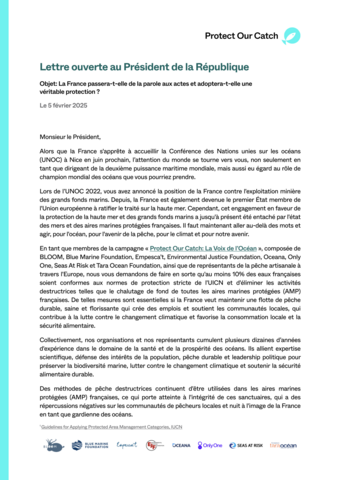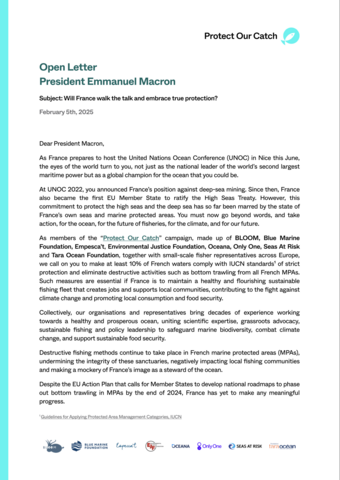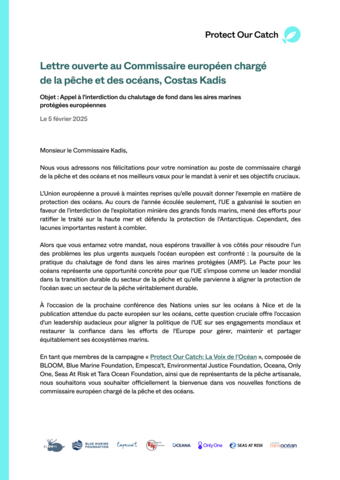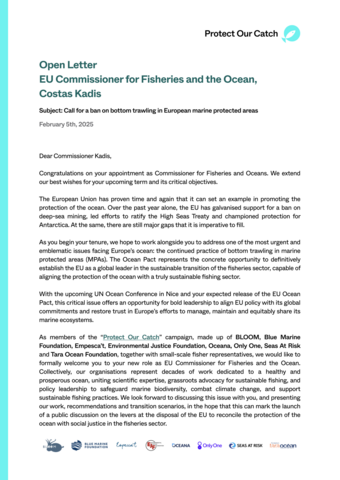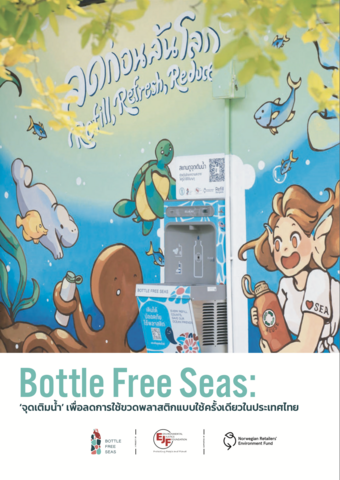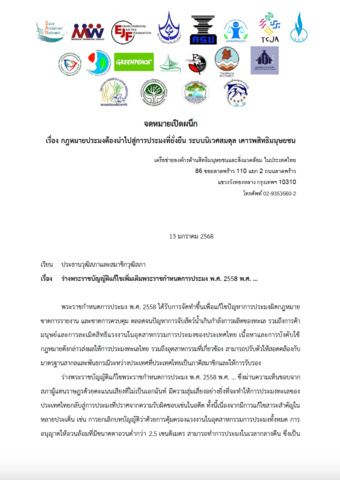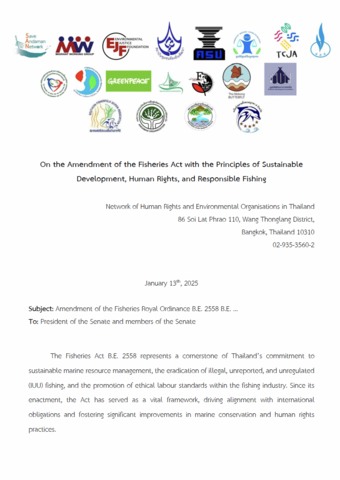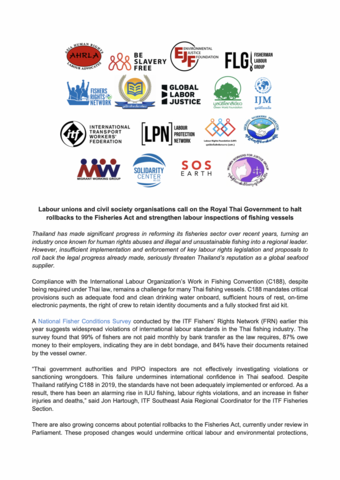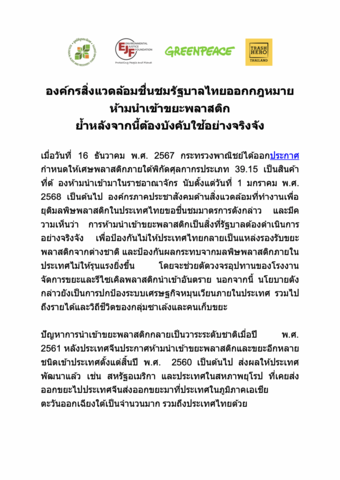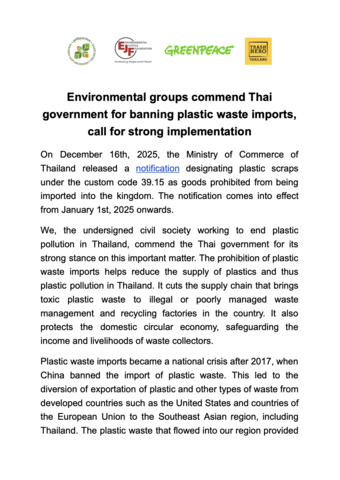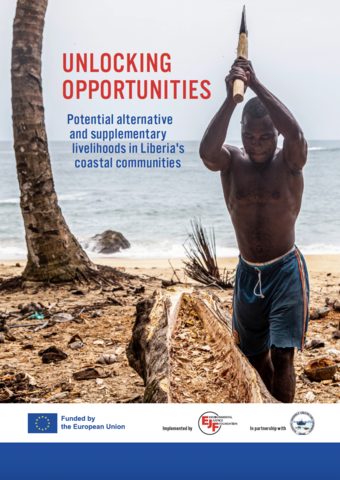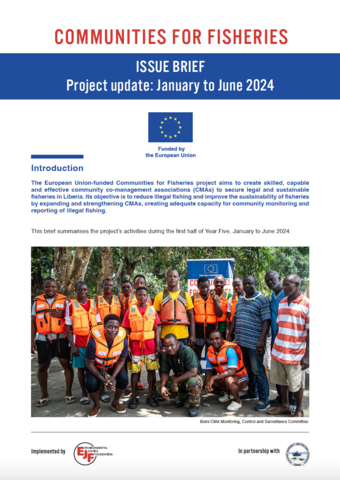Lettre ouverte au Commissaire européen chargé de la pêche et des océans, Costas Kadis: Dans cette lettre ouverte, les membres de la campagne Protect Our Catch, dont le EJF, demandent au commissaire européen chargé de la pêche et des océans, Costas Kadis, de prendre des mesures pour mettre fin au chalutage de fond dans les AMP de l'UE.
รายงานโครงการ Bottle Free Seas “จุดเติมน้ำ” เพื่อลดการใช้ขวดพลาสติกแบบใช้ครั้งเดียวในประเทศไทย: รายงานฉบับนี้บันทึกการเดินทางของโครงการ Bottle Free Seas ในการส่งเสริมแนวทาง รีฟิล (Refill) และใช้ซ้ำ (Reuse) ในประเทศไทย โดยสรุปผลการดำเนินงาน ความท้าทาย และโอกาสในการขยายผล พร้อมแนวทางปฏิบัติและรายการข้อเสนอแนะ เพื่อสนับสนุนองค์กรปกครองส่วนท้องถิ่น เทศบาล จังหวัด และภาคเอกชน ในการพัฒนานโยบายและติดตั้งจุดเติมน้ำดื่ม
จดหมายเปิดผนึก เรื่อง กฎหมายประมงต้องน าไปสู่การประมงที่ยั่งยืน ระบบนิเวศสมดุล เคารพสิทธิมนุษยชน: การแก้ไขพระราชบัญญัติการประมงของไทยอาจส่งผลกระทบต่อความก้าวหน้าในการปราบปรามการทำประมงผิดกฎหมาย ขาดการรายงาน และไร้การควบคุม การปกป้องระบบนิเวศทางทะเล และการรักษาสิทธิแรงงาน จดหมายเปิดผนึกฉบับนี้จากองค์กรภาคประชาสังคม 57 แห่ง รวมถึง EJF เรียกร้องให้วุฒิสภาพิจารณาทบทวนอีกครั้ง
Open letter on the amendment of Thailand's Fisheries Act and the principles of sustainable development, human rights and responsible fishing: Proposed amendments to Thailand's Fisheries Act risk undoing progress in combatting illegal, unreported, and unregulated fishing, protecting marine ecosystems, and upholding labour rights. This open letter from 57 civil society organisations, including EJF, urges the Senate to reconsider them.
Labour unions and civil society organisations call on the Royal Thai Government to halt rollbacks to the Fisheries Act and strengthen labour inspections of fishing vessels: Thailand has achieved notable advancements in reforming its fisheries sector, transforming an industry previously associated with human rights violations and illegal, unsustainable practices into a regional leader. Nevertheless, gaps in the implementation and enforcement of critical labour rights legislation, along with proposals to reverse earlier legal progress, pose significant risks to Thailand's standing as a leading global seafood supplier.
องค์กรสิ่งแวดล้อมชื่นชมรัฐบาลไทยออกกฎหมายห้ามนำเข้าขยะพลาสติก ย้ำหลังจากนี้ต้องบังคับใช้อย่างจริงจัง: เมื่อวันที่ 16 ธันวาคม พ.ศ. 2567 กระทรวงพาณิชย์ได้ออกประกาศกำหนดให้เศษพลาสติกภายใต้พิกัดศุลกากรประเภท 39.15 เป็นสินค้าที่ต้ องห้ามนำเข้ามาในราชอาณาจักร นับตั้งแต่วันที่ 1 มกราคม พ.ศ. 2568 เป็นต้นไป องค์กรภาคประชาสังคมด้านสิ่งแวดล้อมที่ทำงานเพื่อยุติมลพิษพลาสติกในประเทศไทยขอชื่นชมมาตรการดังกล่าว และมีความเห็นว่า การห้ามนำเข้าขยะพลาสติกเป็นสิ่งที่รัฐบาลต้องดำเนินการอย่างจริงจัง เพื่อป้องกันไม่ให้ประเทศไทยกลายเป็นแหล่งรองรับขยะพลาสติกจากต่างชาติ และป้องกันผลกระทบจากมลพิษพลาสติกภายในประเทศไม่ให้รุนแรงยิ่งขึ้น โดยจะช่วยตัดวงจรอุปทานของโรงงานจัดการขยะและรีไซเคิลพลาสติกนำเข้าอันตราย นอกจากนี้ นโยบายดังกล่าวยังเป็นการปกป้องระบบเศรษฐกิจหมุนเวียนภายในประเทศ รวมไปถึงรายได้และวิถีชีวิตของกลุ่มซาเล้งและคนเก็บขยะ
Environmental groups commend Thai government for banning plastic waste imports, call for strong implementation: On December 16th, 2025, the Ministry of Commerce of Thailand released a notification designating plastic scraps under the custom code 39.15 as goods prohibited from being imported into the kingdom. We, the undersigned civil society working to end plastic pollution in Thailand, commend the Thai government for its strong stance on this important matter.
Unlocking opportunities: potential alternative and supplementary livelihoods in Liberia's coastal communities: Overfishing threatens the sustainability of Liberia's fisheries and the livelihoods of thousands of fishers and fish workers. This study explores opportunities for alternative and supplementary livelihood interventions in Liberia’s coastal communities.
Communities for Fisheries issue brief: January to June 2024 project update: The European Union-funded Communities for Fisheries project aims to create skilled, capable and effective community co-management associations (CMAs) to secure legal and sustainable fisheries in Liberia. This brief summarises the project’s activities during the first half of Year Five, January to June 2024.
